For the Tudor monarchy, this state of affairs was not at all ideal. Particularly since most of the English nobility (secretly) considered them to be Welsh upstarts. The danger of defection, just as soon as a viable alternative became available, was even higher for them than any other dynasty in Europe.
So Henry VIII began experimenting with something new. It was put into practice at the Battle of Flodden.
It was actually his queen, Catherine of Aragon, who commanded his forces at Flodden, through the Earl of Surrey. Henry was at the helm of a second English army in France. But all of the military tactics originated with him.
Renaissance warfare collected all of the small militia companies into blocks of larger forces. Their lords were placed at the back. Everyone answered to a single commander instead.
Thus it was at Flodden that ranks of commoners faced rows of Scottish nobles. It must have seemed at the start like it would be the English who'd be slaughtered en masse. But one more major insertion turned the traditional leadership, employed by the Scots, into a desperate disadvantage.
The Welsh and English longbows had been destroying armies for over a century. Cannons and muskets had entered the battlefield during the Wars of the Roses. In both cases, they were deadly but inaccurate. There was also a lull after each missile had been fired. It could take up to eight minutes to refill and prime a 16th century cannon.
Renaissance warfare introduced a startling new idea. It arranged the archers in two or more rows, one lower than the others. One row of archers fired, the other crouched down to reload their weapons. At a signal, they swopped places.
Such a strategy unleashed a constant storm of arrows and cannonballs into the oncoming forces. There was no pause in which to dash forward. It was co-ordinated in a straight line. There was no opportunity to dodge out of the way.
Those Scottish nobles leading from the front were the first to die. There was no-one left alive to command the troops, nor sound the retreat. Waves upon waves of untrained commoners merely rushed forward, following their fallen lairds into the slaughter.



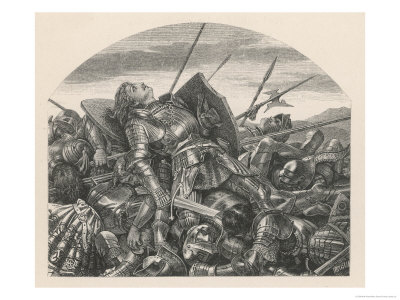


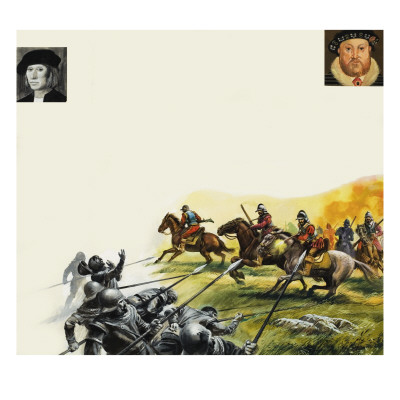

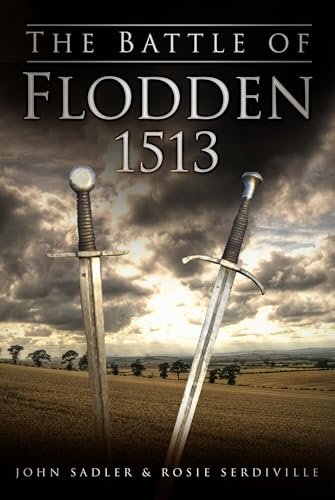

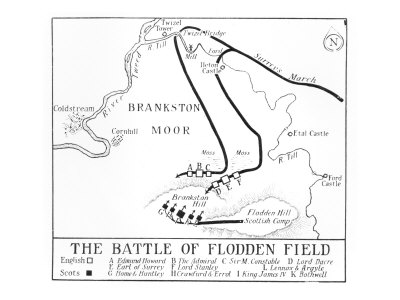



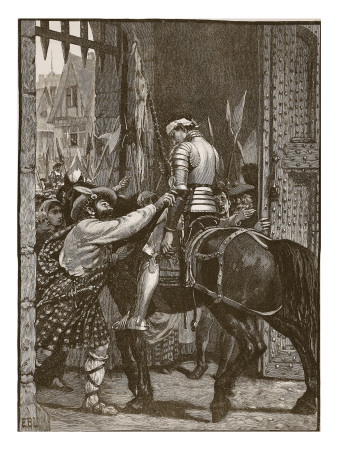










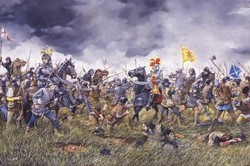

 St Tydecho's Churches in West Waleson 09/03/2014
St Tydecho's Churches in West Waleson 09/03/2014
 Goodies for an Outlander Premiere Partyon 03/06/2015
Goodies for an Outlander Premiere Partyon 03/06/2015
 Holocaust Memorial Day Interview with Rainer Höss, Grandson of Rudolf Architect of Auschwitzon 01/24/2015
Holocaust Memorial Day Interview with Rainer Höss, Grandson of Rudolf Architect of Auschwitzon 01/24/2015
 Romantic Valentine Gifts for an Outlander Fanon 01/16/2015
Romantic Valentine Gifts for an Outlander Fanon 01/16/2015

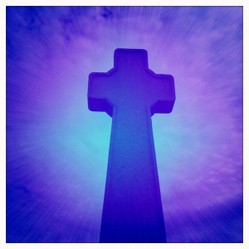
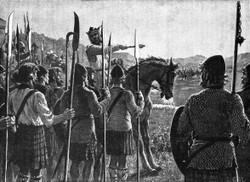
Comments
Now that I can totally agree with, in the case of of Henry VIII!
What is of interest is that he saw himself as virtuous. Genuinely holy people do not think of themselves as righteous, as they are painfully aware of their flaws of character and sins. Once we see ourselves as virtuous, we become blind to our faults and let ourselves do al kinds of wrong.
I doubt many have any love for Henry VIII. Horrified fascination and morbid curiosity maybe, but definitely no love. From my point of view, he was a murderous despot.
But he genuinely did think that he was virtuous. Before he had his marriage to Catherine of Aragon annulled, he spent a long time with his Bible and religious writings. He argued that he should never have been married to her in the first place, because of Biblical scripture.
I'm not saying that his interpretation of Deuteronomy and Leviticus were correct. Merely that he believed them to be so.
Yes, he committed adultery with his mistresses, but so did many other kings at his time. In context, that wasn't seen as going against the commandments. It was seen as the perk of monarchy. As for his marriages, he always carefully annulled the previous one, before he married again, as that would have counted as adultery, or bigamy.
I do not think that Henry was godfearing. He knew the ten commandments: you shall not commit adultery, which he committed as a matter of course. He was intelligent enough to know the church teaching on unjust war, which he perpetrated often enough. He knew the church teaching against the murder of innocents, which he commited more times than I can count. He was one of those who deceived himself about his own virtue.
Sorry! Having grown up in a Catholic family of Irish Catholic tradition, I have no love for Henry, and I struggle with Elizabeth the First.
Bizarrely, Henry VIII seems to have been genuinely very God-fearing, but yes, he did manage to convince himself that his interpretation of God was the correct one. It pretty much allowed him to do whatever he wanted.
I reckon that the God that Henry truly worshipped was himself.
I see similarities between him and any who would kill (or commit genocide) in the name of religion. Each time violence, torture and massacres happen on behalf of any deity, it erodes another chuck of respect from that religion.
Massacring whole regions of Catholics! Can you see similarity between Henry the Eighth and President Assad?
Which makes the 'beautiful desolation' up there a lot more chilling.
Quite true, Jo.